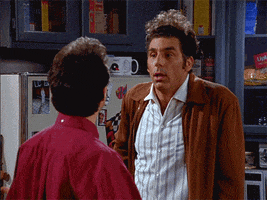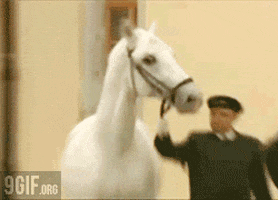TheAmazingCriswell
I predict...
- Apr 28, 2021
- 1,354
Nachts
Versunken in die Nacht. So wie man manchmal den Kopf senkt, um nachzudenken, so ganz versunken sein in die Nacht. Ringsum schlafen die Menschen. Eine kleine Schauspielerei, eine unschuldige Selbsttäuschung, daß sie in Häusern schlafen, in festen Betten, unter festem Dach, ausgestreckt oder geduckt auf Matratzen, in Tüchern, unter Decken, in Wirklichkeit haben sie sich zusammengefunden wie damals einmal und wie später in wüster Gegend, ein Lager im Freien, eine unübersehbare Zahl Menschen, ein Heer, ein Volk, unter kaltem Himmel auf kalter Erde, hingeworfen wo man früher stand, die Stirn auf den Arm gedrückt, das Gesicht gegen den Boden hin, ruhig atmend. Und du wachst, bist einer der Wächter, findest den nächsten durch Schwenken des brennenden Holzes aus dem Reisighaufen neben dir. Warum wachst du? Einer muß wachen, heißt es. Einer muß da sein.Der Aufbruch
Ich befahl mein Pferd aus dem Stall zu holen. Der Diener verstand mich nicht. Ich ging selbst in den Stall, sattelte mein Pferd und bestieg es. In der Ferne hörte ich eine Trompete blasen, ich fragte ihn, was das bedeutete. Er wusste nichts und hatte nichts gehört. Beim Tore hielt er mich auf und fragte: »Wohin reitet der Herr?« »Ich weiß es nicht«, sagte ich, »nur weg von hier, nur weg von hier. Immerfort weg von hier, nur so kann ich mein Ziel erreichen.« »Du kennst also dein Ziel«, fragte er. »Ja«, antwortete ich, »ich sagte es doch: ›Weg-von-hier‹ – das ist mein Ziel.« »Du hast keinen Eßvorrat mit«, sagte er. »Ich brauche keinen«, sagte ich, »die Reise ist so lang, daß ich verhungern muß, wenn ich auf dem Weg nichts bekomme. Kein Eßvorrat kann mich retten. Es ist ja zum Glück eine wahrhaft ungeheure Reise.«Heimkehr
Ich bin zurückgekehrt, ich habe den Flur durchschritten und blicke mich um. Es ist meines Vaters alter Hof. Die Pfütze in der Mitte. Altes, unbrauchbares Gerät, ineinander verfahren, verstellt den Weg zur Bodentreppe. Die Katze lauert auf dem Geländer. Ein zerrissenes Tuch, einmal im Spiel um eine Stange gewunden, hebt sich im Wind. Ich bin angekommen. Wer wird mich empfangen? Wer wartet hinter der Tür der Küche? Rauch kommt aus dem Schornstein, der Kaffee zum Abendessen wird gekocht. Ist dir heimlich, fühlst du dich zu Hause? Ich weiß es nicht, ich bin sehr unsicher. Meines Vaters Haus ist es, aber kalt steht Stück neben Stück, als wäre jedes mit seinen eigenen Angelegenheiten beschäftigt, die ich teils vergessen habe, teils niemals kannte. Was kann ich ihnen nützen, was bin ich ihnen und sei ich auch des Vaters, des alten Landwirts Sohn. Und ich wage nicht an die Küchentür zu klopfen, nur von der Ferne horche ich, nur von der Ferne horche ich stehend, nicht so, dass ich als Horcher überrascht werden könnte. Und weil ich von der Ferne horche, erhorche ich nichts, nur einen leichten Uhrenschlag höre ich oder glaube ihn vielleicht nur zu hören, herüber aus den Kindertagen. Was sonst in der Küche geschieht, ist das Geheimnis der dort Sitzenden, das sie vor mir wahren. Je länger man vor der Tür zögert, desto fremder wird man. Wie wäre es, wenn jetzt jemand die Tür öffnete und mich etwas fragte. Wäre ich dann nicht selbst wie einer, der sein Geheimnis wahren will.Der Geier
Es war ein Geier, der hackte in meine Füße. Stiefel und Strümpfe hatte er schon aufgerissen, nun hackte er schon in die Füße selbst. Immer schlug er zu, flog dann unruhig mehrmals um mich und setzte dann die Arbeit fort. Es kam ein Herr vorüber, sah ein Weilchen zu und fragte dann, warum ich den Geier dulde. »Ich bin ja wehrlos«, sagte ich, »er kam und fing zu hacken an, da wollte ich ihn natürlich wegtreiben, versuchte ihn sogar zu würgen, aber ein solches Tier hat große Kräfte, auch wollte er mir schon ins Gesicht springen, da opferte ich lieber die Füße. Nun sind sie schon fast zerrissen.« »Daß Sie sich so quälen lassen«, sagte der Herr, »ein Schuß und der Geier ist erledigt.« »Ist das so?« fragte ich, »und wollen Sie das besorgen?« »Gern«, sagte der Herr, »ich muß nur nach Hause gehn und mein Gewehr holen. Können Sie noch eine halbe Stunde warten?« »Das weiß ich nicht«, sagte ich und stand eine Weile starr vor Schmerz, dann sagte ich: »Bitte, versuchen Sie es für jeden Fall.« »Gut«, sagte der Herr, »ich werde mich beeilen.« Der Geier hatte während des Gespräches ruhig zugehört und die Blicke zwischen mir und dem Herrn wandern lassen. Jetzt sah ich, daß er alles verstanden hatte, er flog auf, weit beugte er sich zurück, um genug Schwung zu bekommen und stieß dann wie ein Speerwerfer den Schnabel durch meinen Mund tief in mich. Zurückfallend fühlte ich befreit, wie er in meinem alle Tiefen füllenden, alle Ufer überfließenden Blut unrettbar ertrank.Translations (not mine):
At Night
Deeply lost in the night. Just as one sometimes lowers one's head to reflect, thus to be utterly lost in the night. All around people are asleep. Its just play-acting, an innocent selfdeception, that they sleep in houses, in safe beds, under a safe roof, stretched out or curled up on mattresses, in sheets, under blankets; in reality they have flocked together as they had once upon a time and again later in a deserted region, a camp in the open, a countless number of men, an army, a people, under a cold sky on cold earth, collapsed where once they had stood, forehead pressed on the arm, face to the ground, breathing quietly. And you are watching, are one of the watchmen, you find the next one by brandishing a burning stick from the brushwood pile beside you. Why are you watching? Someone must watch, it is said. Someone must be there.
The Departure
I called for my horse to be brought from the stable. The servant did not understand me. I myself went into the stable, saddled my horse and mounted. In the distance I heard a trumpet blast. I asked him what it meant but he did not know and had not heard it. By the gate he stopped me and asked "where are you riding to sir?" I answered "away from here, away from here, always away from here. Only by doing so can I reach my destination." "Then you know your destination" he asked. "Yes" I said "I have already said so, 'Away-From-Here' that is my destination." "You have no provisions with you" he said. "I don't need any" I said. "The journey is so long that I will die of hunger if I do not get something along the way. It is, fortunately, a truly immense journey."
Homecoming
I have returned, I have passed under the arch and am looking around. It's my father's old yard. The puddle in the middle. Old, useless tools, jumbled together, block the way to the attic stairs. The cat lurks on the banister. A torn piece of cloth, once wound around a stick in a game, flutters in the breeze. I have arrived. Who is going to receive me? Who is waiting behind the kitchen door? Smoke is rising from the chimney, coffee is being made for supper. Do you feel you belong, do you feel at home? I don't know, I feel most uncertain. My father's house it is, but each object stands cold beside the next, as though preoccupied with its own affairs, which I have partly forgotten, partly never known. What use can I be to them, what do I mean to them, even though I am the son of my father, the old farmer? And I don't dare knock at the kitchen door, I only listen from a distance, I only listen from a distance, standing up, in such a way that I cannot be taken by surprise as an eavesdropper. And since I am listening from a distance, I hear nothing but a faint striking of the clock passing over from childhood days, but perhaps I only think I hear it. Whatever else is going on in the kitchen is the secret of those sitting there, a secret they are keeping from me. The longer one hesitates before the door, the more estranged one becomes. What would happen if someone were to open the door now and ask me a question? Would not I myself then behave like one who wants to keep his secret.
The Vulture
A vulture was hacking at my feet. It had already torn my boots and stockings to shreds, now it was hacking at the feet themselves. Again and again it struck at them, then circled several times restlessly round me, then returned to continue its work. A gentleman passed by, looked on for a while, then asked me why I suffered the vulture. "I'm helpless," I said. "When it came and began to attack me, I of course tried to drive it away, even to strangle it, but these animals are very strong, it was about to spring at my face, but I preferred to sacrifice my feet. Now they are almost torn to bits." "Fancy letting yourself be tortured like this!" said the gentleman. "One shot and that's the end of the vulture." "Really?" I said. "With pleasure," said the gentleman, "I've only got to go home and get my gun. Could you wait another half hour?" "I'm not sure about that," said I, and stood for a moment rigid with pain. Then I said: "Do try it in any case, please." "Very well," said the gentleman, "I'll be as quick as I can." During this conversation the vulture had been calmly listening, letting its eye rove between me and the gentleman. Now I realized that it had understood everything; it took wing, leaned far back to gain impetus, and then, like a javelin thrower, thrust its beak through my mouth, deep into me. Falling back, I was relieved to feel him drowning irretrievably in my blood, which was filling every depth, flooding every shore.
---------------------------------------------------------------------------------------------------------------------------------------------------------------------------------------
Two excerpts from his diaries:
Immerfort die Vorstellung eines breiten Selchermessers, das eiligst und mit mechanischer Regelmässigkeit von der Seite in mich hineinfährt und ganz dünne Querschnitte losschneidet, die bei der schnellen Arbeit fast eingerollt davonfliegen.
Durch das Parterrefenster eines Hauses an einem um den Hals gelegten Strick hineingezogen und ohne Rücksicht, wie von einem, der nicht acht gibt, blutend und zerfetzt durch alle Zimmerdecken, Möbel, Mauern und Dachböden hinaufgerissen werden, bis oben auf dem Dach die leere Schlinge erscheint, die auch meine Reste erst beim Durchbrechen der Dachziegel verloren hat.
Translations (not mine):
Always the vision of a butcher knife which, hurriedly and with mechanical regularity, drives into me from the side and cuts away paper-thin cross-sections that fly away almost curled up in the fast work.
Being dragged in through the first floor window of a house by a rope placed around the neck and being dragged up bleeding and ragged without consideration, as if by one who does not pay attention, through all the ceilings, furniture, walls and attics until the empty noose appears on top of the roof, which also lost my remains only when breaking through the roof tiles.
Last edited:






